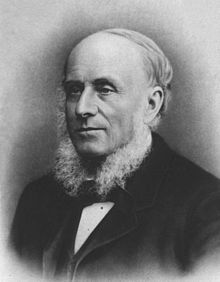Alexander Bain
Scottish philosopher and educationalist (1818–1903)
Alexander Bain (11 June 1818 – 18 September 1903) was a Scottish philosopher and educationalist in the British school of empiricism and a prominent and innovative figure in the fields of psychology, linguistics, logic, moral philosophy and education reform. He founded Mind, the first ever journal of psychology and analytical philosophy, and was the leading figure in establishing and applying the scientific method to psychology.

Quotes
edit- Instinct is untaught ability.
- Alexander Bain, The Senses and the Intellect (1855), p. 256; in Hoyt's New Cyclopedia Of Practical Quotations (1922), p. 397-98.
- Disinterestedness is as great a puzzle and paradox as ever. Indeed, strictly speaking, it is a species of irrationality, or insanity, as regards the individual’s self; a contradiction of the most essential nature of a sentient being, which is to move to pleasure and from pain
- Alexander Bain, On the Study of Character, including an estimate of phrenology, 1861, p. 292.
- The arguments for the two substances - mind and body - have, we believe, entirely lost their validity; they are no longer compatible with ascertained science and clear thinking. One substance with two sets of attributes, two sides (a physical and a mental), a double-faced unity, would appear to comply with all the exigencies of the case.
- Alexander Bain. Mind and Body: The Theories of their Relation (1872), p. 196; as cited in: The Popular Science Monthly, Vol. 27, June 1885, p. 162.
Education as a Science, 1898
editAlexander Bain. Education as a Science, (New York, 1898). Reported in Memorabilia mathematica or, The philomath's quotation-book by Robert Edouard Moritz. Published 1914.
- What renders a problem definite, and what leaves it indefinite, may best be understood from mathematics. The very important idea of solving a problem within limits of error is an element of rational culture, coming from the same source. The art of totalizing fluctuations by curves is capable of being carried, in conception, far beyond the mathematical domain, 65 where it is first learned. The distinction between laws and coefficients applies in every department of causation. The theory of Probable Evidence is the mathematical contribution to Logic, and is of paramount importance.
- pp. 151-152.
- Those that can readily master the difficulties of Mathematics find a considerable charm in the study, sometimes amounting to fascination. This is far from universal; but the subject contains elements of strong interest of a kind that constitutes the pleasures of knowledge. The marvellous devices for solving problems elate the mind with the feeling of intellectual power; and the innumerable constructions of the science leave us lost in wonder.
- p. 153.
- The method of arithmetical teaching]] is perhaps the best understood of any of the methods concerned with elementary studies.
- p. 288.
- He that could teach mathematics well, would not be a bad teacher in any of the rest [physics, chemistry, biology, psychology] unless by the accident of total inaptitude for experimental illustration; while the mere experimentalist is likely to fall into the error of missing the essential condition of science as reasoned truth; not to speak of the danger of making the instruction an affair of sensation, glitter, or pyrotechnic show.
- p. 298.
Quotes about Alexander Bain
edit- Alexander Bain was probably the first modern thinker whose primary concern was with psychology itself He has been credited with writing the first 'comprehensive treatise having psychology as its sole purpose'. His two-volume systematic work, The Senses and the Intellect (1855) and The Emotions and the Will (1859), was the standard British text for almost half a century, until Stout's replaced it. He also founded Mind (1876-), the first psychological journal in any country. His work requires close attention, because it is the meeting-point of experimental sensory-motor physiology and the association psychology. His influence on the conceptions of later workers was direct and extremely important. Ferrier studied classics and philosophy under Bain at Aberdeen (first class honours, 1863). When he and Jackson acknowledge their intellectual debts or make references to psychology, the names most often mentioned are Bain and Spencer-the figures whose work was the culmination of the association psychology in its traditional form.
- Robert Maxwell Young Mind, Brain, and Adaptation in the Nineteenth Century, 1970. p. 101.